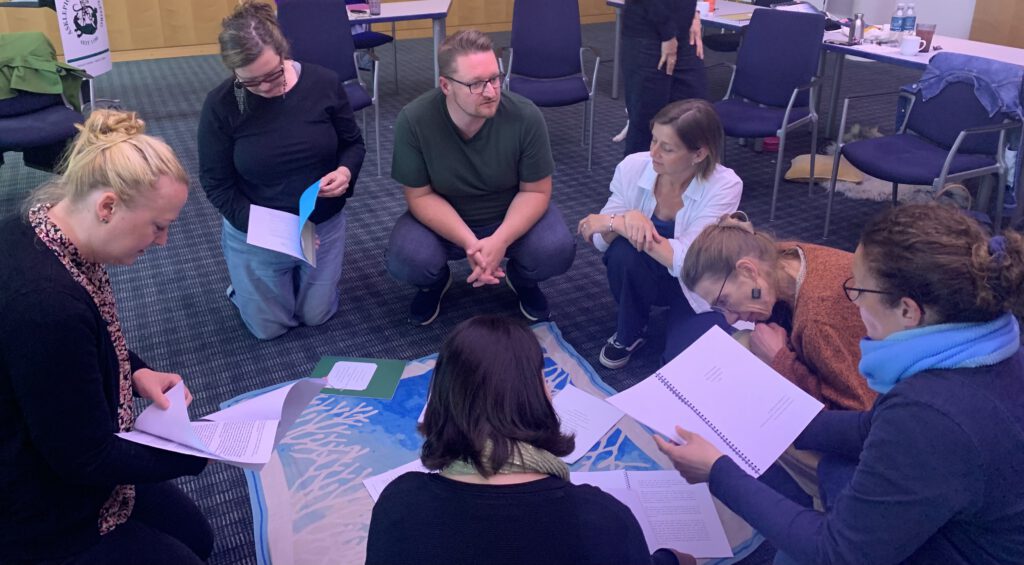Masterclass weekend palligraphy & supervised practise phase
Do you want me to come to your country and teach a masterclass in palligraphy for your institution?
Read on, and if you are interested, please get in touch to discuss possible dates and details!
After more than five years of “story care” on palliative care wards and in hospices in Hamburg, I have now reached the point where I want to pass on my experience and knowledge of biography work with dying people to others. And while „story care“ remains the umbrella term for my work, I have been calling the resulting booklet “palligraphy” for some time now, a play on the words “palliative” and “biography”, inspired by calligraphy, the art of beautiful writing.
Palligraphy is based on elements of “dignity-therapy” according to Professor Harvey Chochinov, which I have translated into narrative structures. I use the unifying power of archetypal narrative patterns and the gentle magic of classical storytelling to trace red threads in colorful lives and to help people in the most existential phase of their lives to die in self-consistency.
Over the past few years, I have seen time and again how palligraphy has allowed many different circles of life to close peacefully. For the participating patients and hospice guests, the opportunity to share the difficult, challenging and sad moments in life and death, to bear witness to them and thus also to honor them, has proven to be particularly helpful.
It is one thing to talk about all the things that have gone well in life, but it takes courage, trust, mindfulness and openness on both sides to address and express the hard truths of life at the death bed. Truths that still leave so many people speechless in everyday life.
Palligraphy work is therefore also about finding words for the seemingly unspeakable. This can help to create a greater awareness of the personal farewell situation, but every palligraphy is also a small, very valuable contribution to a more open approach to dying and death in our society. I am so grateful to all my interviewees over the past few years for being willing to tell me their stories in the face of death. In doing so, they have not only left a valuable memory for their loved ones, but have also given me a great gift, as I have been able to learn and grow from each person and continue to refine my approach.

Now I would like to pass on what I have learned to you in a Masterclass Weekend Palligraphy, follwed by a practical phase accompanied by online appointments.
During the attendance weekend, we will deal with the following topics:
- Derivation of the dignity model and development of dignity therapy according to Chochinov
- Archetypal narrative patterns and structures
- Effect of traditional storytelling; influence on the hormone constellation and the autonomic nervous system
- Narrative medicine in a palliative context
- Presentation of the palligraphy questionnaire
- Analysis of several real case studies
- Self-awareness through partner exercises
- Role of the palligrapher: High Involvement, Low Attachment
- Teaching the technical tools for carrying out palligraphy
We will then start a practical phase lasting several weeks, during which you will independently carry out and design a palligraphy in your professional or private environment. Within the group, we’ll agree on two different dates on wchich we’ll meet online and present and discuss your “journeyman’s pieces”. The submission of your own palligraphy and participation in at least one online meeting is the prerequisite for completing the master class with a certificate and subsequently being allowed to use the protected name “palligraphy”.
Entry requirements: It is vital to me that all participants have a real chance of actually getting into practice after successfully completing the course. For this, it is helpful to already be affiliated with an institution, service or organization that provides care for people with palliative illnesses.
For the same reason, I can only accept interested people into the masterclass who already have demonstrable previous experience with palliative care patients, beyond their own family environment – e.g. nurses, psychotherapists or psycho-oncologists, occupational therapists, art or music therapists, social workers, alternative practitioners, care assistants and, of course, trained or trainee hospice volunteers with other professional backgrounds.
Journalistic knowledge is not necessary, more important are the skills to be able to meet people in an existential situation at eye level and not to be afraid of difficult and sad topics. But don’t worry, I’ll support you with that too. A good feel for language and good word processing skills are very helpful in any case.
Interested? Send me an email and tell me a bit more about you and your organization and I’ll be in touch shortly!
